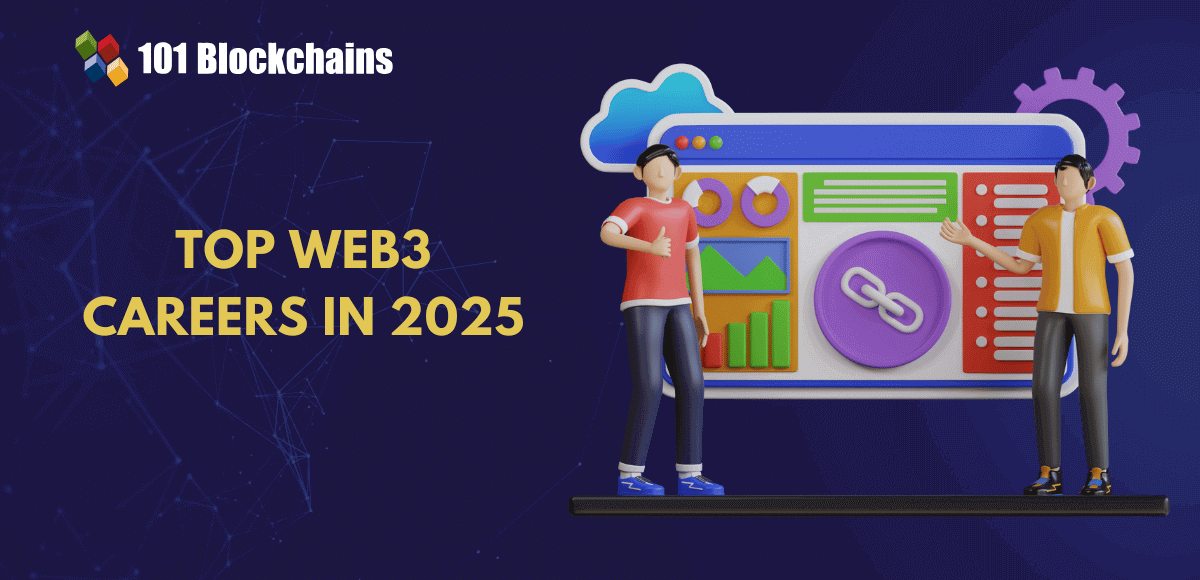Learn how blockchain truly works, master key definitions, and uncover what makes smart contracts so "smart." Dive into the fundamentals, gain valuable insights, and start your blockchain journey today!

Web3
Georgia Weston
on September 19, 2022
Top 5 Advantages of Web 3.0
Beginning from the early days of the internet in the 1990s, the web has gradually become one of the integral parts of our everyday life. At the same time, the technologies, networks and protocols underlying the internet have been evolving at a radical pace. Subsequently, user experiences on the internet have also been through some significant changes. As the world starts moving towards web3, the interest in top web 3.0 advantages is increasing by huge margins. What is web3? How is it better than the previous versions of the internet? Are we using any web3 applications or services now? You would obviously have many similar doubts while trying to figure out what web3 is all about. The following discussion will offer a basic overview of the evolution of web3 and its notable advantages.
The Journey to Web3
The best way to identify the key web 3.0 advantages would point to a detailed understanding of how web3 came into existence in the first place. In the first stage, i.e., web 1.0, the internet was all about static pages which served information or carried out transactions such as ticket booking. Users did not have any opportunity to interact with the web.
Then arrived web 2.0 with the concept of user-generated content and a sporadic rise of e-commerce and social media platforms. The second phase of the internet allowed users to create content and publish it on the internet as well as share it with other users. At the same time, web 2.0 also opened up the road to more personalization in the web with dynamic as well as responsive algorithms.
However, web 2.0 also features a significant setback in the form of tech organizations serving as centralized authorities over information access and ownership. The top web3 benefits aim at resolving the setbacks evident with web2, which relies profoundly on centralized protocols and servers. Furthermore, web 2.0 also suffers from many critical issues in self-sovereign identity, internet privacy and data portability.
Curious to develop an in-depth understanding of web3 application architecture? Enroll Now in Web3 Application Development Course!
What is Web 3.0?

The one question, which is an integral highlight in any discussion on web3, now has a significant implication. Web 3.0 is new, and anyone can decipher the meaning of this new concept according to their understanding. For starters, you need to know that the web3 advantages focus on resolving some of the most dominant and critical issues in the existing web landscape. The development of web3 does not have any centralized authority as the supervisor. On the contrary, the progress in web3 development depends on a collection of private businesses, individuals and non-profit organizations.
As web3 is still in the stages of infancy, it is quite difficult to outline a straightforward definition. However, you can assume it as the third iteration of the internet, featuring decentralization, transparency and autonomy for users. The basic definition of web3 definitely offers a credible foundation for understanding its advantages.
Get familiar with the terms related to Web 3.0 with Web 3.0 Flashcards
How Can Web 3.0 Change the Internet?
The most striking highlight in answers to “What are the advantages of Web 3.0 application?” would refer to the impact of web3 on the internet itself. A detailed understanding of how web3 would change user experiences can give you a basic impression of its advantages. Here are some of the notable elements in the web 3.0 architecture which prove its potential for changing the internet.
-
Blockchain
Most of the developments in web3 right now utilize blockchain technology for addressing many notable issues associated with web 2.0. Blockchain plays a central role as the reason for top web 3.0 advantages such as decentralization. Blockchain technology is vital in the world of web3 as it facilitates the development of an open and trustless ecosystem. In addition, the decentralized consensus mechanism with blockchain can help in enabling flexible interaction among users without the need for central authorities.
Build your identity as a certified blockchain expert with 101 Blockchains’ Blockchain Certifications designed to provide enhanced career prospects.
-
Semantic Web
The outline of notable advantages of web3 would also reflect on the feature of semantic web. As a matter of fact, the operational model of web3 must have the capability of processing a varying assortment of digital content. Web3 can rely on semantic web for making use of information in digital content through development of complex associations and inferences regarding contextual data.
-
Artificial Intelligence
Artificial Intelligence or AI software would also serve as one of the crucial highlights for key web 3.0 advantages and for empowering the semantic web. AI technologies would contribute value benefits to the web3 landscape by differentiating fraudulent information from genuine content.
-
Security and Ubiquity
The most distinctive trait of web3 points to the creation of a new era of interconnected devices along with multiplatform interoperability. The decentralized network infrastructure would enable users to have ownership of their data. In addition, web3 would help applications in becoming more independent from devices, with support for working on different hardware and software platforms.
-
Immersive 3D Experiences
The web3 ecosystem would also feature more 3D graphics, particularly with the use of advanced VR technologies. Any discussion on “What are the advantages of web 3.0 application?” would showcase how web3 can embrace immersive experiences for dissolving the barriers between physical and virtual worlds. The immersive technology components such as VR, AR or XR technologies could help in introducing new approaches for interaction with products and services.
Build your identity as a certified blockchain expert with 101 Blockchains’ Blockchain Certifications designed to provide enhanced career prospects.
Advantages of Web3
The basic overview of the road to web3 and its definition prove how it is an essential necessity right now. Furthermore, the features of web3 showed a glimpse of its potential for changing the internet and user experiences. Based on the inferences regarding web3 fundamentals, you can identify the significant advantages delivered by web3. Here are some of the prominent advantages of web3 that everyone should watch out for.

1. Control over Data Ownership
Take a look around at all the online services and platforms you use on a daily basis. You enter your personal information on different platforms to obtain access to different services. You create content such as pictures or videos and share them online on Facebook and Instagram. Amidst all this, you must have assumed that your personal information in an Amazon account or the photos in your Facebook profile are secure and in your control.
However, that is not the case, as centralized authorities like Facebook, Google, and Amazon monetize user data in different ways. The web3 advantages by design would ensure that end-users would have complete control over the data they own. Users could share information according to their preferences. Therefore, web3 might provide the benefits of overcoming monopoly over user data by the tech giants.
2. Ubiquitous Access to Data
The interconnectivity aspect of web3 also serves as a vital foundation for a notable web 3.0 advantage. Web3 would largely involve the creation of an interconnected ecosystem that allows interoperability and seamless access to information. However, IoT connectivity would drive one of the top web3 benefits, i.e., ubiquitous access to data. Users can access any type of information from any location with any device. Web3 could ensure that you can connect to the internet even without using your computer or smartphone.
3. Freedom for Interactions
The biggest entry in a list of top web 3.0 advantages would focus on how it helps in ensuring seamless interactions among users. Web3 does not have any centralized authority controlling access of users as it builds up on the permissionless trait of blockchain. Public blockchain networks serving as the foundations of web3 applications could help in ensuring that anyone can access web3.
Users would not have to encounter the barriers of income, gender, sexual orientation, social status or geographical location to access digital services. The basic design of web3 can help users transfer digital assets, wealth or information efficiently at faster speeds worldwide. Without any centralized authority over the transactions, web3 can offer freedom to internet users to capitalize on the true potential of the web.
Learn the fundamentals, challenges and use cases of Web3.0 blockchain from the E-book: An Introduction To Web 3.0 Blockchain
4. Advantages for Creators
The arrival of web3 has signaled a promising opportunity for all content creators. Most content creators struggle to get the actual value for their work, owing to the intermediaries in different channels for reaching their audience. The key web 3.0 advantages from the features of tokenization and creator economy could serve notable benefits for creators.
First of all, web3 would ensure decentralized control over security of digital assets such as tokens and data. On the other hand, creators would have complete control over the ownership of their work. At the same time, the creator economy could also help creators find new tools and marketplaces for expanding their reach.
5. Better Security
The final and the most important entry among web3 advantages would refer to the assurance of better security. Blockchain could provide the assurance of decentralization and cryptography for ensuring safeguards for user data. The consensus mechanisms and basic design of blockchain make it impervious to common security breaches. While 51% of attacks are still one of the possibilities for hacking web3 applications and systems, the evolution of new security measures and best practices can solve the challenges.
Build your fluency in advanced technologies as a web3 expert, Enroll Now in world leading Web3 Expert Career Path
Final Words
The outline of top web3 benefits showcases how decentralization, security and autonomy take the front seat in the web3 ecosystem. Web3 applications have emerged as plausible solutions to many of the setbacks evident in web2. However, it is also important to note whether the advantages of web3 have any relevant value over the previous version.
Therefore, you must notice how web3 serves as an improvement over web 2.0 with its distinctive features. The features of web3 establish the foundation for its advantages and other value benefits to end-users. As you learn more about web3, you could figure out how its advantages can shape the future of internet. Start your learning journey with comprehensive training courses on web3 concepts now.







